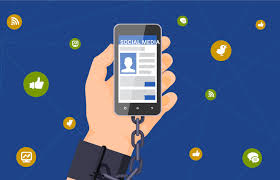Cell phones are powerful computers, but without the applications and social media that your teen can and likely already have downloaded, they wouldn’t be altogether too interesting. They might want to have it at their sides at all times in case a friend texts or calls, but it is the games and social media platforms that cause the prevalent issues of cell phone addiction that we see today.
What are the Signs of a Cell Phone Addiction?
- Consistent Use of Cell Phone
- Inability to Use Their Phones Less
- The Go-To Solution if Experiencing Negative Emotions
- Experience of Withdrawal Symptoms
- Prioritizing Cell Phone Use Over People or Activities
Physical Symptoms of Addiction
The physical teenage cell phone addiction symptoms include injuries like eye strain, which can exhibit as blurriness, fatigue, burning, pain, or headaches. Your teen may also experience neck pain.
The psychological symptoms include a disrupted sleep schedule because your teen cannot get off their phone, even to go to bed, depression, OCD, a difficulty managing in-person relationships, or even anxiety.
What to Do If You Think Your Teen Is Addicted to Their Cell Phone
Talk With Your Teen
The first step is to talk with your teen. Let them know a few teenage cell phone addiction statistics, that you suffer from cell phone addiction as well, and why you all need to work to become less focused on your phones. By having an open discussion, you have the chance of working towards an unplugged life with your teen.
Install App Limiters
There are applications that you can download that monitor your phone use and, more importantly, block access after a certain period of time. This way, you can allow your teen to use social media, but it encourages them to use it sparingly. These apps can be used on computers as well, though certain platforms require a premium subscription.
- Tip: Parents should use these apps as well! Though parenting difficult teenage daughter can be challenging due to the changing hormones, and sons can be just as aggressive to the change, the fact is that social media addiction and cell phone addiction is not a teen-only issue. Adults also suffer and chances are you need a break from your cell phone.
Contact Us
If you are having a hard time dealing with teenage girls and boys in your family, and need more help getting them to overcome their cell phone addiction, then give us a call. We will help you understand your options and let you know how we can help your teen overcome their addiction.
Benefits of Overcoming Cell Phone Addiction
Cell phone addiction can lead to an increased risk of the potentially harmful influence of celebrities on youth. This addiction can also make it more likely that your teen will text or use social media while driving, which, combined with natural teenage risk behavior, can mean your teen gets into an accident that hurts them or someone else.
By taking control of this addiction, you can minimize the effects of the most dangerous apps. Facebook, Instagram, Twitter, Reddit – these dangerous apps for teens can end up taking over their entire attention and result in their attention falling, grades dropping, and more. Minimizing and eliminating a cell phone addiction will make coping with teenager daughter self-esteem issues easier, as it will reduce the celebrities influence on our youth generation.
Mendi is a passionate advocate for teens and adults in the mental health and addiction arenas. Mendi envisions and creates programs bringing a unique approach to mental health and substance use treatment.
Clinically trained, Mendi earned a BA with honors in psychology and social work at the University of Maryland and an MSW at the University of Maryland School of Social Work. His extensive experience as a therapist includes individual and group psychotherapy for children, adolescents, adults and families in various settings.
Mendi has gained insight and experience from his work at several treatment centers, which include the Chesapeake Center for Youth Development, the Carroll County Youth Services Bureau, Chabad Crisis Centers and the Center for Discovery and Adolescent Changes.
Prior to launching Hope Street, Mendi conceived and built multiple successful, high end adolescent and adult residential facilities and outpatient programs that include Ignite Teen Treatment, Eden Treatment and Elemental Treatment.
Mendi has appeared on the Dr. Phil show, is regularly featured in mental health and addiction publications and speaks around the country in person, on TV and on Radio shows on these topics.
With his newest ventures, Mendi instills a unique blend of energy, creativity and expertise to the treatment of teens, adults and their families dealing with trauma, addiction and mental health issues.
The son of a Rabbi and eldest of 11 children, Mendi is a part-time rock musician, boxer, cantor and father of four.
